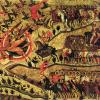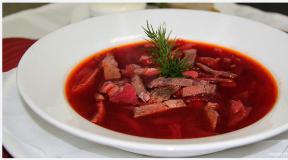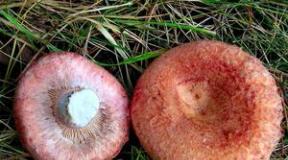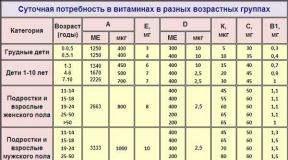Who can benefit from mineral water in the treatment of IBS. Treatment of irritable bowel syndrome (IBS). Prohibited foods and treatment with folk remedies
Simonova T. M., Kurbatov V. A., Sergeeva O. A.
Office of the President of the Russian Federation Federal State Institution "Sanatorium" Oak Grove ", Zheleznovodsk
Functional diseases of the gastrointestinal tract (FGID) are widespread in economically developed countries (according to some reports, they affect about 70% of the population). Irritable Bowel Syndrome (IBS) is a classic example of FBGCT. Irritable bowel syndrome is a disorder of the motor and secretory function of the intestine, mainly the large intestine, without structural (organic) changes in the organ. Great importance in the occurrence of motor and secretory disorders of the intestine is attached to psychogenic factors and stress.
We observed 25 patients with IBS who received complex sanatorium-resort treatment, including sparing or sparing-training motor regimen, therapeutic exercises, dietary nutrition, mineral water from the Slavyanovsky spring for internal (drinking) and external (in the form of baths) use, and also intestinal procedures (siphon bowel lavage mineral water the same physicochemical composition as for internal use), and microclysters (with a decoction of herbs and oil). For drinking treatment, mineral water from the Slavyanovsky spring was used, which was prescribed at 3-3.5 ml / kg of body weight 40-45 minutes before meals 3 times a day. For baths, the same as for drinking treatment, mineral water with a temperature of 36-370C was used, for 15 minutes 3-4 times a week. The number of baths was 10-12 per course of treatment.
Patients were predominantly aged 20 to 55 years (92%), with a disease duration of 1 to 10 years - 24 people (96%). Of these, there were 18 women (72%), men - 7 (28%).
The clinical picture of the disease was characterized by the presence of obstipation syndrome in all patients (100%), pain in 16 (64%), dyspeptic syndrome in 21 (84%), and psychoemotional disorders in 22 (88%). In 23 (92%) patients with obstipation syndrome, the frequency of defecation was less than 3 times a week. The majority of patients - 20 (80%) noted difficulties in the act of defecation of varying severity.
Pain syndrome was observed in 60% of patients and varied in intensity from unpleasant sensations (discomfort in the abdomen) to short-term attacks of intestinal colic localized in the left lower quadrant of the abdomen or hypogastrium. In 12 patients (48%), pain occurred before the act of defecation and disappeared shortly after it. About half of the patients (52%) noted a clear relationship between the occurrence of pain and psycho-emotional stress. In 6 patients (24%), pain occurred after eating. Patients with IBS noted complaints of pain in the projection of the intestine only during wakefulness, they were absent during sleep. An objective examination revealed bloating, moderate pain over its entire surface in most of them, in 13 (52%) spasmodic sigmoid colon was palpated. Dyspeptic symptoms were noted in 21 (84%) patients and were manifested mainly by heartburn and belching, nausea was detected in 5 (20%) patients. Complaints of bloating, rumbling in the abdomen, increased gas emission, especially in the afternoon, were presented by 21 (84%) patients.
Psychoemotional disorders were observed in 22 (88%) patients. Their severity was assessed using generally accepted psychological tests. Headaches and weakness were reported by 15 (60%) patients, irritability — by 22 (88%) patients, sleep disturbance — by 6 (24%) patients.
After the resort treatment, most patients showed a positive trend in the main clinical and paraclinical indicators. This resulted in an improvement in the act of defecation (the frequency of defecation at least 4 times a week) in 13 (65%) patients. Approximately with the same frequency, complaints of difficulty in defecation and a feeling of incomplete emptying of the intestine decreased. Pain syndrome decreased in 12 (75%), dyspeptic symptoms - in 15 (71.4%), psycho-emotional disorders - in 14 (66.7%), headaches and weakness significantly decreased in 8 people (32%).
The overall effectiveness of spa therapy was 76%.
Thus, the low-mineralized mineral water of the Slavyanovsky spring, when used internally and externally, has a beneficial effect on the clinical symptoms of irritable bowel syndrome by reducing the frequency of manifestation of the main clinical syndromes: pain, dyspeptic and obstipation.
Treating irritable bowel syndrome with or without diarrhea is often problematic, even though active development medicine and pharmacology around the world. For example, in the United States, more than 20% of the total population suffers from this pathology. With irritable bowel syndrome, symptoms and treatment are under the authority of a gastroenterologist, who should be contacted for this disease. If all people face periodic stool problems and usually know what to do, then the pathology in question causes exhausting, chronic indigestion, which seriously affects the overall performance of a person, his physical and psychological state.
The essence of the phenomenon
At its core, this pathology (IBS) is a chronic intestinal disorder with a violation of its functions for no apparent reason. This phenomenon is accompanied by abdominal pain, stool disorders, discomfort, and inflammatory reactions or infectious lesions are not detected. Even blood and stool tests do not give an informative result.
Irritable bowel can occur in people of any age and gender. However, women suffer more often from this phenomenon (almost 2 times). The peak manifestation of pathology occurs at the age of 32–38 years. Unfortunately, up to 2/3 of all affected people do not go to the doctor, trying to cope with this on their own. In principle, this problem in the intestines rarely leads to organic disorders, but it cannot be started, because the nervous system suffers significantly, and the body's being in a constant state of stress cannot pass without a trace.
The pathology of irritable bowel as a disease is characterized by functional disorders in the form of a deterioration in intestinal motility and susceptibility to its stimulation of a neurohumoral or mechanical nature.
In other words, under the influence of non-pathogenic factors, the intestine ceases to adequately respond to the corresponding signals, which disrupts the mode of its emptying.

The phenomenon under consideration can develop both in the large and in the small intestine. The most common is irritable bowel syndrome (IBS). It is in it that the formation of fecal masses occurs, and therefore the violation of peristalsis leads to disorders of the stool and problematic defecation. According to the nature of the manifestations, irritable bowel syndrome, like IBS in general, is divided into 3 types: the predominance of abdominal pain and flatulence; IBS with diarrhea and IBS with constipation.
Etiology of the disease
The causes of irritable bowel syndrome have not yet been fully elucidated. However, medical statistics and the results of numerous studies give a general picture of the most common etiological mechanism. Most experts believe that most often the pathology is caused by nervous stress or prolonged psychological overload.
It has been unequivocally established that the syndrome appears in people with increased nervous excitability against the background of psychological stress. As a rule, this factor prevails among young women.
The influence of the neurogenic factor resembles a vicious circle: stressful situations give rise to IBS, and its chronic course causes nervous disorders. They also exacerbate the symptoms of pathology even more. As a result of such mutual influence, neuroses and psychopathy of various varieties often arise. Irritable bowel syndrome is rarely generated by nervous influence, but if it has already appeared, then stress can greatly exacerbate the clinical picture.

With irritable bowel syndrome, the causes are associated with other endogenous and exogenous factors:
- Increased activity of the muscles and nerve endings of the digestive tract, which causes impaired intestinal motility. In such cases, no visible disturbances in the stenotic structure or intestinal nervous apparatus are detected, but the regulation of intestinal motility is still disturbed.
- Individual hypertrophied sensitivity of the body to the filling and stretching of the intestine, which causes pain during small loads on the intestines, although in other people they are considered the norm.
- hormonal factor. During periods of a sharp change in the hormonal balance in the body, signs of IBS are noted. In women at the beginning and end of menstruation, they are associated with a significant increase in blood levels of prostaglandin.
- One of the common etiological factors is malnutrition. The irritating effect is created by fatty foods with excessive calories and simple overeating. The risk of pathology increases with the use of strong coffee and tea, sweet mineral water with gas, and especially alcoholic beverages. In addition, it is necessary to take into account the individual intolerance of certain products by the body.
- Hereditary predisposition quite often becomes a decisive factor in the onset of the disease.
- Attacks of gastroenteritis can provoke chronic intestinal upset, becoming a trigger for triggering the IBS mechanism. A similar effect can be expected from dysbacteriosis.
- The question of how to get rid of irritable bowel syndrome has to be addressed with long-term use of certain medications. Antibiotics stand out especially in this direction, which, in addition to pathogenic microorganisms, also destroy beneficial microflora, upsetting the balance.

Summarizing the above, we can characterize the etiological mechanism of IBS as follows. The small and large intestines are elements of the digestive tract, and the passage of processed food is provided by the contractile functions of the muscular layer of the intestinal walls. With a slowdown or excessive activation of contractions, the process of formation and excretion of feces is disrupted, and other signs of pathology appear. If muscle dysfunction persists for a long time, then we can talk about the appearance of irritable bowel syndrome. This causes pain, diarrhea or constipation.
Symptomatic manifestations
Symptoms of irritable bowel syndrome manifest as functional intestinal and extraintestinal disorders. The first category, depending on the type of pathology, includes the following main symptoms: abdominal pain, diarrhea (defecations more than 3 times a day with a liquid stool) or constipation (defecations less than 3 times a week). Extraintestinal manifestations include neurological, vegetative, psychopathological disorders, as well as disorders in other digestive organs.
When IBS proceeds according to the variant with a predominance of diarrhea, the following features of the symptomatology are noted. The most characteristic symptom is diarrhea, which occurs very often after different reasons. Food intake is especially noticeable. The urge to urgently defecate occurs immediately after dinner or during meals, and the symptom is most intense in the first half of the day. A person begins to suffer from the so-called "bear's disease", when diarrhea violently manifests itself with any psychological stress, emotional arousal, fear. In addition to diarrhea, with the development of this type of IBS, other symptoms can be observed: bloating, pain in the abdomen on the sides, which increase with unexpected urge to defecate and disappear after it.

Constipation-predominant syndrome, on the contrary, leads to a significant delay in bowel movements. Breaks between processes can be more than 3 days. Fecal mass becomes dense, often takes the form of small "lamb coils". An admixture of whitish or transparent mucus may be released. Prolonged stagnation of feces leads to pain along the entire length of the colon in the form of colic or aching sensations. Chronic constipation causes a deterioration in appetite, heartburn, nausea, and an unpleasant aftertaste in the oral cavity.
Finally, it is possible to develop IBS according to variant 3, when abdominal pain predominates. In this case, the violation of the stool looks like an alternation of diarrhea and constipation in an unpredictable pattern. Most characteristic symptom- constant pain in the abdomen.
Finally, the following signs can be distinguished that characterize IBS: abdominal pain of a spastic, stabbing or aching type, becoming less intense or disappearing altogether after defecation; violation of the chair; inability to contain the urge to defecate; constant feeling of fullness of the intestines even after emptying them; flatulence and bloating; nausea; the appearance of mucous impurities in the feces. These signs are distinguished by their duration, i.e., the chronic nature of the whole phenomenon.
Prolonged disturbances in bowel emptying lead to numerous disorders of extraintestinal localization. It is necessary to note the most characteristic symptoms:
- Disorders of the neurological and vegetative type: migraine (felt by almost half of all patients), lumbar pain, sensation of a coma in the throat, chilliness of the hands, insomnia at night and drowsiness during the day, poor quality breath, dysmenorrhea, various types of dysuria, impotence.
- Psychopathological disorders: various phobias, depression, panic attacks, hypochondria, anxiety syndrome, hysteria (such disorders are observed in almost 2/3 of patients).
- Disorder of other digestive organs: pain in the hypochondrium on the right side, vomiting, feeling of heaviness in the epigastrium, signs of non-ulcerative dyspepsia (observed in almost 85% of all victims). In addition, irritable syndrome often develops. Bladder.
Lack of treatment or poorly treated IBS leads to serious abnormalities. The apparent relative safety for health is deceptive. The psychological effects are so great that they can cause severe neurological abnormalities. Constant diarrhea exhausts the body, leads to dehydration and leaching of important trace elements. Naturally, a person's working capacity decreases, insomnia appears.

Disease detection methods
With irritable bowel syndrome, diagnosis faces certain difficulties in differentiating the pathology. Symptoms of IBS are similar to those of many other diseases of the gastrointestinal tract. Most often, the diagnosis of this phenomenon is made by the method of exclusion, i.e., by external examination, laboratory and instrumental methods, other diseases are excluded.
It will not be possible to establish IBS directly from the tests, given the absence of changes in the composition of blood, urine or feces. There is also no infectious component. Taking into account such features of the pathology, the criteria for making a diagnosis are adopted:
- discomfort and recurrent pain in irritable bowel syndrome are of a long-term nature, and they coincide with a period of increased urge to defecate and a change in the nature of the feces;
- pain sensations significantly decrease or disappear after bowel movement;
- pain symptoms and discomfort last for at least 5 months, and are felt for at least 3-4 days during the month throughout the entire period.

It is based on the presence of these criteria that a diagnosis is made, but then it is necessary to conduct an examination to exclude other diseases. With the manifestation of symptoms such as impaired defecation, unstable stool, abdominal pain, the following diagnostic procedures are performed:
- general and biochemical analysis of blood and feces;
- radiography with the introduction of a contrast agent (usually barium sulfate);
- endoscopic studies by introducing a special endoscope through the anus - the device allows you to visually assess the condition of the colon and take a sample for biochemical analysis;
- coprogram, and if necessary, sigmoidoscopy, irrigoscopy.
- biopsy of the intestinal walls.
When conducting research, first of all, it is necessary to differentiate irritable bowel syndrome (or small intestine) from iron deficiency anemia, vitamin B deficiency, lactose deficiency, celiac disease, and tumor formations.
Diet for sickness
Improper and excessively abundant nutrition often provokes the syndrome in question. Given this circumstance, treatment for irritable bowel syndrome begins with ensuring optimal nutrition (mode and menu). The most important thing is to organize frequent, fractional meals with the exclusion of foods that can have a negative impact.

The following products can be distinguished, which are recommended to be significantly limited, and it is better to completely remove them from use. The influence of products is noted:
- stimulate the appearance of diarrhea: apples, plums, beets, foods rich in fiber;
- increase gas formation and flatulence: legumes, pastries, cabbage, nuts, grapes;
- Contribute to constipation: fried foods and fatty foods.
It should be borne in mind that quite often people have an individual intolerance to milk. Whole milk is recommended to be replaced with fermented milk products (kefir, curdled milk, fermented baked milk). At risk of celiac disease, gluten-containing foods are excluded. It is better to avoid sugary carbonated drinks and chewing gum.
- meals should be regular, without long breaks, uncontrolled fasting and overeating;
- it is recommended to drink at least 1.5–2 liters of liquid, but without caffeine (it is best to drink tea with medicinal herbs);
- coffee and tea - no more than 0.5 liters per day;
- the use of drinks with gas and alcoholic beverages should be excluded;
- it is recommended to introduce a restriction on fresh fruit - no more than 250–300 g per day;
- flaxseeds and oats (can be in the form of porridge) are great for reducing gas formation.
An alternative approach is needed when eating fiber-rich foods. The fact is that with diarrhea, such products are banned as diarrhea stimulants. However, in chronic constipation, dietary fiber (fiber) helps to soothe an irritable bowel. The most common suppliers of dietary fiber are bran, wholemeal bread, grains, some fruits and vegetables (plums, cabbage, zucchini, carrots, beets).
It is necessary to distinguish between types of fiber (soluble and insoluble). For dietary nutrition, you need a soluble type, which is found in oats, nuts, seeds, pectins. You can use the pharmacy option - Nefagula powder.
Principles of treatment of pathology
Questions about how to treat pathology and how to calm an irritated organ are solved in a complex way: nutrition optimization, elimination of psycho-emotional effects, lifestyle optimization with an increase in physical activity, drug therapy. Therapeutic and preventive measures are carried out for any type of IBS, but in order to cure the disease by traditional means, it is necessary to take into account the specifics of the manifestation of the disease.

What should be the treatment?
The following remedies help to cure IBS with the predominance of diarrhea:
- Before meals, a remedy is prescribed that can slow down motor functions. The most common drugs for irritable bowel syndrome are: Diphenoxylate, Loperamide, Imodium, Lopedium.
- A sedative effect is provided by a remedy such as Smecta.
- Decoctions of medicinal plants are recommended: sweet cherry, bird cherry, pomegranate peel, alder.
- Sorbents are able to reduce gas formation: Polysorb, Polyphepan, Filtrum, Enterosgel.
- A modern medicine for irritable bowel syndrome with diarrhea is a serotin receptor modulator drug Alosetron.

In the variant of IBS with constipation, pathology is treated with agents that can facilitate bowel movements and soften feces. The most commonly prescribed drugs are:
- Plantain-based medicines to increase the volume of contents in the intestines: Naturolax, Mucofalk, Solgar, Metamucil, Fiberlex, Ispagol. In addition, products based on agar and artificial cellulose are used: Citrucel, Fiberal, Fibercon. These drugs usually begin to work 9 to 11 hours after administration.
- Fecal softening is provided by drugs with lactulose: Duphalac, Portolac, Goodluck. They, without getting into the blood, are able to change the consistency of the stool.
- Means of the laxative category of the osmotic type: Macrogol, Forlax, Lavacol, Relaxan, Exportal. These funds give effect in 2-5 hours.
- Mild laxatives: Norgalax, Guttasil, Guttalax, Slabikal, Slabilen.
- Serotin modulators: Tegaserol, Prucalopride.
- To create a mild laxative effect, Essentuki 17 mineral water is recommended, which contains magnesium ions.

If abdominal pain predominates in the manifestation of irritable bowel syndrome, then the following drugs are prescribed as drug therapy:
- antispasmodic drugs: No-shpa, Drotaverine hydrochloride, as well as anticholinergic drugs: Hyoscyamine, Zamifenacin, Darifenacin;
- calcium channel blockers: Spazmomen, Ditsitel;
- means for regulating intestinal motility - Debridat;
- drugs to reduce gas formation (foaming agents): Espumizan, Zeolate, Polysilane.
Symptomatic therapy
At complex treatment therapy is carried out for the most pronounced symptoms that can worsen the condition of a sick person. Antidepressants are prescribed to reduce neurological and psychopathological disorders. This effect has a double effect: it eliminates the psychogenic etiological factor and prevents the development of neurogenic abnormalities as a symptom of the disease. The most commonly used are tricyclic antidepressants. They reduce the sensitivity of brain receptors to pain and normalize the transmission of nerve regulatory impulses. Traditional drugs are: Amitriptyline, Imipramine, Northtriptyline. In addition, modern agents are prescribed: Befol, Fenelzine, Pyrazidol.
An important role in the treatment process is given to the improvement of the intestinal microflora and the elimination of signs of dysbacteriosis. With the development of IBS, pathogenic microorganisms are activated and a deficiency of lactobacilli and bifidumbacteria appears. The suppression of pathogenic bacteria is carried out by probiotics: Enterol, Baktisuptil. With a more severe course of the disease, nitrofurans, fluoroquinolones, intestinal antiseptics (Rifaksimin) are prescribed. Normalization of the content of beneficial microflora is ensured with the help of eubiotics (Linex, Bificol) and prebiotics (Lactulose, Hilak-forte).

A positive effect is noted when using folk remedies in the form of medicinal plants. The following compositions are especially noted: mint oil for aromatherapy; infusions and decoctions of chamomile, oak bark, caraway seeds, valerian root; infusions against constipation from licorice root, yarrow, buckthorn bark. In the fight against diarrhea, burnet roots, cinquefoil, plantain, blueberries, sage, walnuts are used.
IBS is a common phenomenon, to which people do not always have an adequate attitude. To exclude neurological abnormalities and other complications, this pathology must be treated with effective methods.
Many have probably noticed how, after a strong excitement or stress, a wave of pain rolls through the stomach. Well, if the usual no-shpa is at hand, it will relieve the painful spasm. However, even without medicine, when the nervous system returns to normal, the discomfort will also disappear by itself. Worse, if over time, abdominal pain becomes the norm.
Healthy lifestyle correspondent Lyubov Ulyanova asked Anatoly Ivanovich Vanin, Candidate of Medical Sciences, Head of the Department of Coloproctology of the Federal State Institution "Polyclinic No. 1" of the Presidential Administration of the Russian Federation, to explain what happens to the intestines when a person is not in a good mood.
For many years, scientists and doctors did not know how to classify a person's condition, in which he periodically experiences certain discomfort in the intestines, unpleasant sensations, incomprehensible, transient pains. The malaise raised many questions, because it was sometimes difficult to even call it a disease. However, as there were more and more patients with such symptoms, about five years ago a new chapter appeared in the international classification - irritable bowel syndrome, abbreviated as IBS.
Irritable bowel syndrome is a functional condition that most often occurs after stress, malnutrition, or as a result of infection, when a conditionally activated pathogenic microflora appears in the intestine. The main symptoms of IBS are constipation, diarrhea, mucous discharge, usually without blood, bloating, spastic pain (colic), usually in the lower abdomen.
In irritable bowel syndrome, the entire intestine is usually affected, starting with the stomach. The disease can be acute and chronic.
IBS is more common in young people, aged 25-40, men and women.
Since similar symptoms are characteristic of many other diseases, in particular, polyps, ulcerative colitis, cancer, Crohn's disease, differentiation of the disease is necessary. Suppose, when a person complains of bloating, you need to look for the cause, the trigger of the symptom. Sometimes endoscopic, x-ray studies of the gastrointestinal tract are required. And if only functional changes are revealed, we can talk about IBS.
First of all, this is an increased or decreased secretion of digestive juices, against the background of which fermentation, putrefactive processes in the gastrointestinal tract occur, and as a result, belching, nausea, bloating, and gas formation occur. Changes can also be in the structure of the mucous membrane: thickened folds appear or, on the contrary, its smoothness. chronic syndrome irritated bowel is accompanied by constipation, more severe spastic pains. Although the cause of all unpleasant manifestations is usually one - household stress.
Often, against the background of irritable bowel syndrome, dyskinesia, dysbacteriosis, caused, in particular, by taking high doses of antibiotics, can occur. That is why the symptoms of IBS must be approached comprehensively.
Having removed the next, long-term syndrome, do not wait until it manifests itself again, and do a colonoscopy. Such an examination will be painless if you take 1 tablet of dicetel 3 times a day with meals for 3 days. After taking dicetel, the examination goes like clockwork.
I note that dicetel, as well as pancroflat, espumizan, disflotil, meteospasmin relieve intestinal spasms in IBS well. However, I still advise you to use less of any chemicals, and use more natural preparations, herbal infusions, follow a diet, take physiotherapy, do simple exercises to train the muscles of the abdomen and pelvic floor. For example, the same "bicycle" is indicated for intestinal hypokinesia, and well-known relaxation exercises - for hyperkinetic type of colon motility.
If the intestines are weak, infusions of verbena grass, knotweed, common toadflax are useful. For a glass of boiling water - 1 teaspoon, take a quarter cup three times a day before meals. And an hour and a half before meals 2-4 times a day, you can drink a glass of cold mineral water without gas such as Slavyanovskaya, Smirnovskaya, Batalinskaya. Eat more raw vegetables and fruits, as well as cold dishes.
If the intestines, on the contrary, are extremely active, infusions of linden flowers, chamomile, calendula, yarrow, oregano herb, lemon balm, mint, hop seedlings, fennel fruit, and carrot tops will soothe it. Brew and receive - the same. With abundant gas formation, fennel is especially effective, with spasms - lemon balm. Chamomile will remove both. Therefore, you can use 2-3 types of herbs at the same time. From mineral waters, “Borjomi”, “Narzan” are suitable - 1-1.5 cups heated, without gas, an hour before meals 2-3 times a day. Food should also be taken mostly warm.
Warm (37-38 degrees) general (or sitz) baths will relieve intestinal spasms no worse than drugs. Especially useful With sea salt: pour 2 kg of salt with hot water, then fill the bath to the top, lie down for 20 minutes - and the pain will pass, and at the same time the nervous system will calm down. Sea bath can be replaced or alternated with coniferous, having bought the appropriate concentrate at the pharmacy. It’s good to make a wet wrap for the night by wetting a towel warm water and applied to the affected area.
And further. We must not forget that any strong emotional situations always affect the manifestations of irritable bowel syndrome, whether it be the death of a loved one, the joy of having a long-awaited child, or an emergency, “burning” at work. IN Lately there is an increase in functional diseases, and in almost every third patient the symptoms of IBS are associated with social, domestic troubles. That is why - work, rest, emotions - everything should be in moderation.
irritable bowel syndrome is a disease characterized by frequent periods of constipation and diarrhea and is usually accompanied by pain or bloating. After food is partially digested in the stomach, it is pushed through the small intestine and then through the large intestine by regular contractions of the intestinal wall muscles (peristalsis). In irritable bowel syndrome, these muscles can cramp and move food around too quickly (leading to diarrhea) or too slowly (leading to constipation). Irritable bowel syndrome should not be confused with the more serious inflammatory bowel disease.
There is no cure for irritable bowel syndrome; however, symptoms can be reduced by a combination of specific exercise and diet. Sometimes medication brings relief. Irritable bowel syndrome is more common in women than in men; symptoms may worsen during menstruation.
Causes
The cause of irritable bowel syndrome is unknown, although it is thought to be related to gastrointestinal problems rather than general violations in organism.
Emotional stress can be a contributing factor.
Certain foods can cause disease outbreaks. Typical irritants include fatty foods such as bacon, poultry skin, vegetable oil, margarine and dairy products, as well as foods that cause excessive gas such as beans and broccoli.
This is a fairly common variant of a functional bowel disorder, which is a violation of the motor and secretory functions of the intestine, combined with increased sensitivity of its various departments to a number of nutritional factors (allergic, temperature, mechanical, etc.), of a neuro-emotional nature. Irritable bowel syndrome is often the result of past infections, intoxications, and helminths. It can occur as a consequence of previous dysentery, salmonellosis, and other acute inflammatory diseases, when the causative factor has already lost its significance, inflammatory and other pathological processes have disappeared, but an altered susceptibility (reactivity) of the mechanisms of regulation of intestinal activity remains. At the same time, a wide variety of influences (psycho-emotional, food, physical overload, cooling, overheating, cold infections, etc.) can cause the manifestation of painful symptoms from the intestines.
Symptoms
Constipation, diarrhea, or both.
Discomfort, pain, bloating or cramps in the abdomen.
Excessive gas production.
Feeling that the bowels are not completely emptied.
Nausea.
The disease often occurs at a young age, more often in women. The disease proceeds in waves and is characterized by the appearance of attacks of acute, cramping pain in the abdomen. The pain is accompanied by a frequent urge to go down, with the discharge of a small amount, usually unformed or liquid, of feces, sometimes with a high content of mucus. Attacks of pain, often against the background of bloating and rumbling in the abdomen with the release of mucus and diarrhea, last from 20-30 minutes to several days, followed by normal stools and general well-being.
Short-term functional bowel disorders can be observed with food excesses, with alcohol abuse, including when taking dry wines, champagne, and soft drinks, especially cold carbonated ones (lemonade, Pepsi-Cola). In such cases, a few hours (rarely minutes) after a heavy meal, especially fatty or poorly combined (for example, milk with cucumbers and fish), there may be short-term diarrhea, rumbling and transfusion, pain throughout the abdomen. As a rule, the general condition of patients suffers little.
Functional disorders of the intestines in the form of constipation, diarrhea, bloating and increased gas formation, short-term pain may be the initial manifestation of inflammatory or other (organic) diseases. Therefore, self-treatment or (even worse) the indifference of patients to the onset of symptoms of the disease is a gross mistake in relation to their health. In all cases, the most correct step is to contact a local therapist or gastroenterologist, conduct a set of necessary studies under their guidance and supervision, and receive recommendations for treatment and prevention after the diagnosis is established.
Diagnostics
Medical history and physical examination are required. The diagnosis is made when the possibility of other diseases, such as cancer and inflammation of the intestine, is excluded.
A barium enema may be needed. Barium creates a clear picture of the bowel on x-rays.
To view the entire large intestine (colonoscopy) or part of it (rectosigmoidoscopy), a small tube with a light on the end may be used.
Treatment
You can try eating fiber foods. Some people find that their symptoms improve when they eat fiber-rich foods (raw fruits and vegetables, bran, whole grain breads, and dried vegetables). Others claim that eating fibrous foods exacerbates symptoms.
You should eat more often and in small amounts.
Counseling with a psychologist and auto-training can help relieve stress. Regular moderate exercise can also reduce tension and relieve symptoms.
The doctor may prescribe laxatives, tonics, anti-spasmodics, or sedatives, or medicines to improve digestion.
Smoking can act as a trigger and should therefore be avoided.
In the treatment program for patients with irritable bowel syndrome, the most important is the individualization of nutrition. During the period of exacerbation of the disease, increased frequency of diarrhea, abdominal pain, and other phenomena, it is necessary to switch to a therapeutic diet according to diet No. 4c, exclude from the diet foods and dishes that are poorly tolerated by the patient. With a tendency to diarrhea and the predominance of fermentation processes in the intestines (rumbling, bloating), it is recommended to avoid milk, milk soups and cereals. Such lactic acid products as yogurt, kefir, acidophilus and fermented baked milk should be treated individually, depending on tolerance. Spicy sauces, gravy, canned food in tomato, refractory fats, cold drinks, pastry products are contraindicated.
Patients with irritable bowel syndrome should study the characteristics of their body well enough in terms of the reaction of the intestines to the nature and diet so that conditions are not created for exacerbating the process. So, most of these patients do not tolerate cold, carbonated drinks, especially on an empty stomach. Therefore, you should beware of lemonade, Pepsi-Cola, water from the siphon, as well as juices and compotes immediately from the refrigerator. It is advisable to exclude strong coffee, which provokes diarrhea, from the diet, or drastically reduce its use.
Many patients do not tolerate well not only overeating, which causes intestinal upset, but also plentiful food. Therefore, meals should be frequent, but small, especially in the morning. Within 30-40 minutes after eating, patients with irritable bowel syndrome should not engage in physical labor, especially heavy, so as not to cause diarrhea. It is difficult to enumerate all the situations that each patient may encounter during his illness and that stimulate bowel dysfunction. This suggests a definite conclusion: to know all the reasons for the deterioration of the course of the disease and to prevent their recurrence.
With a tendency to diarrhea, dried blueberries are recommended in the form of infusion, decoction (1-2 teaspoons per cup of boiling water) or in the form of blueberry jelly, as well as bird cherry fruits (10 g per 100 g of water, take no more than 0.5 cup 2-3 times a day). day). To neutralize irritating substances with diarrhea, activated charcoal or carbolene is prescribed (1-2 g twice or thrice a day). However, its long-term use is undesirable due to the possible development of enzyme deficiency of the digestive organs, deterioration in the absorption of vitamins and mineral salts in the intestine. In order to stop or reduce diarrhea, medicinal herbs can be successfully used,
Significant assistance in the treatment of irritable bowel syndrome at home can be provided by the internal use of mineral waters. This provides a calming effect on impaired intestinal motility, a decrease in irritation and hypersensitivity of its mucous membrane, and an improvement in the functional state of other digestive organs. With diarrhea due to increased motor function of the intestine, hot (40-45 ° C) low- and medium-mineralized waters containing HCO3 and Ca ions are prescribed (Smirnovskaya, Slavyanovskaya, Feodosiyskaya, Jermuk, Borjomi, Essentuki No. 4 "and others; 100 ml 3 times a day 30-90 minutes before meals, depending on the initial level of gastric secretion: with low acidity - 30 minutes, with normal - 40-60, with increased - 90 min).
Small intestinal procedures in the form of therapeutic enemas are also very effective for diarrhea, especially in cases where irritable bowel syndrome is accompanied by an inflammatory process in the area of the intestinal outlet (sigmoid and rectum). They are performed as follows. Half an hour after a small warm cleansing enema, delivered very carefully, 250-350 ml of warm mineral water is slowly introduced (such as Essentuki No. 4 or Essentuki No. 17, Smirnovskaya, Slavyanovskaya, Jermuk, Arzni" and others). This portion of water should be tried to hold in the intestines as long as possible. The procedure often does not cause an urge, and the water is completely absorbed into the intestines, providing a good anti-inflammatory effect, eliminating violations of the intestinal motor function. Therapeutic enemas can be done every day for 2-3 weeks.
Prevention
There is no known way to prevent irritable bowel syndrome, however symptoms can often be relieved by dietary changes and exercise.
Make an appointment with your doctor if the signs of irritable bowel syndrome are interfering with daily activities.
Finally, one should seriously warn against the uncontrolled use by patients medicines, especially antibiotics, sulfonamides, enzymes and other agents. The illogicality and danger of self-medication with the listed medicines for irritable bowel syndrome, as well as for other forms of functional bowel diseases, lies in the fact that these potent drugs are intended to suppress pathogenic (pathogenic) intestinal microbes that are absent in the considered functional diseases, to treat pronounced inflammatory phenomena intestinal mucosa and deep disorders of intracavitary and parietal digestion, which is also not present in patients with intestinal dyskinesia and irritable bowel syndrome. Moreover, not being able to influence the pathogenic microorganisms of the intestine, antibiotics, sulfanilamines and other potent drugs show their side effect - a detrimental effect on the normal intestinal microflora, which leads to dysbacteriosis. As a result, fermentation processes are intensified, the supply of vitamins to the body worsens, and adverse effects appear. All this should convince of the danger of self-treatment, the expediency of seeking advice from a doctor to select an individually indicated treatment.
This is one of the most common diseases on earth. According to statistics, about one in four people suffer from irritable bowel syndrome (IBS). However, only one in three of them asks for help. The disease is also known as intestinal neurosis or irritable bowel syndrome.
Description and causes of the disease
Against the background of other diseases of the gastrointestinal tract, irritable bowel syndrome stands apart. After all, it would seem that nothing can provoke him. In patients with IBS, there is no damage to the intestinal mucosa by pathogens, as well as any pathology of the tissues of the intestinal tract of inorganic origin. And, nevertheless, the disease manifests itself, and sometimes numerous examinations cannot establish what is actually happening with the human body.
Now in medical science the point of view prevails that in most cases the direct cause of irritable bowel syndrome is stress. This is confirmed by the fact that anxiety, depression and other neurotic disorders are observed in approximately 60% of patients with IBS.
To understand why this happens, you should understand the mechanism of the intestine. The main functions of the large intestine are the absorption of water and minerals from food debris, the formation of feces and their promotion to the rectum. The latter tasks are carried out due to the contraction of the muscle walls and the secretion of mucus.
It may seem surprising to many, but the intestines do not always work on their own, in a completely autonomous mode. The intestines have their own nervous system called the enteric. It is part of the vegetative nervous system and is not directly dependent on the central nervous system. However, the regulatory regions of the brain are responsible for the production of substances that control the work of the autonomic nervous system, including the intestinal nervous system. This connection is called the gut-brain axis and is two-way. And in stressful situations, failures in the functioning of this mechanism begin. The brain gives the wrong signals to the intestines, and that, in turn, incorrectly informs the brain about the processes taking place in it. There is a violation of intestinal motility, the slightest discomfort in the intestine causes bouts of pain. This is due to another important circumstance in which the disease develops - increased level sensitivity to pain.
However, stress and low pain threshold are most often not the only factors that cause the disease. In most cases, there is a whole range of reasons.
Circumstances contributing to the occurrence of irritable bowel syndrome:
- Dysbacteriosis
- Irregular and unbalanced diet
- Sedentary lifestyle, sedentary work
- genetic predisposition. It has been established that the majority of those suffering from IBS have close relatives who also had a similar disease.
- Violation hormonal background in women (for example, during pregnancy or during menstruation)
An important role in the occurrence of irritable bowel syndrome is played by the nutritional factor. There are certain categories of foods that often contribute to the appearance of IBS. Such products include:
- Alcohol
- Carbonated drinks
- Snacks and products
- Chocolate
- Caffeinated drinks
- Biscuit
- Fatty food
IBS can also occur after completion of treatment for certain infectious diseases intestines. This type of irritable bowel syndrome is called postinfectious.
Among the factors that cause IBS, sometimes also called overgrowth microflora. However, beneficial microorganisms cannot cause intestinal problems on their own, and there is no scientific evidence that they are associated with IBS. Another thing is the growth of pathogenic microorganisms, but such diseases are infectious and require completely different approaches and methods of treatment.
Irritable bowel syndrome is almost twice as common in women as in men. Perhaps this is due to the greater emotionality of the weaker sex, as well as the fact that women are more likely to experience changes in hormone levels. It is also possible that women are simply more likely to seek medical attention. IBS is predominantly a disease of middle age, since the highest frequency of the disease occurs at the age of 25-40 years. In older people (over 60), the disease is much less common.
In children and adolescents, irritable bowel syndrome is also not uncommon, but there are no exact statistics on this. Often, IBS in children is ignored, mistaking it for infectious bowel disorders. Many experts believe that cases of irritable bowel syndrome, detected in adulthood, are formed in childhood.
Symptoms of irritable bowel syndrome
Irritable bowel syndrome is characterized by chronic symptoms such as increased gas production (flatulence), bloating, constipation, diarrhea (diarrhea), pain and colic in the lower abdomen. Approximately one in three diseases accompanied by similar symptoms is IBS. An important feature is that discomfort in the abdomen, as a rule, appear after eating and disappear after defecation.
The pains are usually cramping (spastic). However, aching or stabbing pains can also be observed.
Also, the disease is characterized by such signs as mucus discharge with stools, changes in stool consistency, irresistible or false urge to defecate, a feeling of incomplete emptying of the intestine after defecation.
There are three main types of irritable bowel syndrome:
- Accompanied by diarrhea (approximately 2/3 of the total number of patients)
- Accompanied by constipation (about a quarter)
- Combining constipation and diarrhea (less than 10%)
In some cases, stool changes are not observed, and all the symptoms of irritable bowel syndrome are reduced to increased flatulence and intestinal colic.
By diarrhea it is customary to mean emptying the intestines, which occurs at least three times a day. As a rule, people suffering from this kind of disease feel the urge in the morning or in the morning. At night, urges are usually absent. Also, diarrhea often begins in case of stress or strong feelings. This syndrome is sometimes called "bear disease".
Constipation is considered a stool that occurs no more than once every three days. Constipation can also be accompanied by symptoms such as dyspepsia, nausea, dry mouth. There may be colic before the stool, which disappear after a bowel movement.
Also, patients have autonomic disorders, such as headaches, insomnia,. Irritable bladder syndrome may also occur (in almost a third of cases).
Diagnostics
If you have symptoms similar to those of IBS, it is recommended that you get tested. It is best to consult a gastroenterologist. Diagnosing IBS is not an easy task. Usually, the diagnosis of IBS is made if all attempts to find some infectious agents or intestinal pathologies in the analyzes or research results fail.
It is also important to consider the frequency of symptoms and the length of time they are present. The world's leading gastroenterologists have proposed the following criteria. It is generally accepted that IBS includes stool disorders that occur at least 3 days a month. They must also be observed for 3 consecutive months. It is also necessary to take into account the relationship between the occurrence of symptoms and changes in the frequency and appearance chair.
When diagnosing, it is necessary to separate from IBS such ailments as:
- infectious diseases of the gastrointestinal tract
- helminthic infestations
- dysbiosis
- anemia
- beriberi
- tumors
- polyps
- ulcerative colitis
- short bowel syndrome
- intestinal tuberculosis
- Crohn's disease
Bowel disorders resembling IBS may also be present in some forms. diabetes, thyrotoxicosis, carcinoid syndrome. Intestinal disorders in the elderly require particularly careful examination, since IBS is generally not typical for older people.
With IBS, you should also not confuse isolated cases of gastrointestinal upset that can occur in healthy people after heavy feasts, drinking large amounts of alcohol, carbonated drinks, unusual or exotic food, for example, while traveling.
Signs such as fever, acute symptoms or worsening over time, night pain, spotting, persistent for several days, lack of appetite, weight loss, are not characteristic of IBS. Therefore, their presence indicates some other disease.
When diagnosing, it is necessary to do the following tests:
- General blood analysis
- Blood chemistry
- Fecal analysis (coprogram)
- Blood test
To exclude pathologies of the large intestine, methods of colonoscopy and irrigoscopy, esophagogastroduodenoscopy, abdominal ultrasound are used. In some cases, a biopsy of the intestinal wall may also be used. With severe pain syndrome, the doctor may suggest undergoing electrogastroenterography, manometry, balloon dilation test.
With a tendency to diarrhea, testing for lactose tolerance and analysis of the intestinal microflora is carried out. If diarrhea is not present, a radioisotope transit method may be used. After completing the initial course of treatment, some diagnostic procedures may be repeated in order to establish the degree of effectiveness of therapy.
Treatment of irritable bowel syndrome
A complete cure for the disease is difficult due to the fact that, as a rule, it is caused not by one cause, but by their complex. In addition, medicine has not yet established the exact mechanism for the development of the disease, so there is generally no treatment regimen for irritable bowel syndrome. But this does not mean that it is completely unknown how to treat and how to treat the disease. Practice shows that irritable bowel can be cured in about a third of cases, and in the rest it is possible to reduce the degree of symptoms.
On the other hand, irritable bowel syndrome cannot be called a disease that threatens life and health. Irritation of the intestine gives patients a lot of trouble, but usually in itself does not lead directly to any complications, dysfunctions and lesions of the gastrointestinal tract tissues.
Many people who have been diagnosed with IBS gradually get used to their symptoms and treat themselves, or adjust their lifestyle so that the disease does not interfere with it.
However, the disease should not be ignored, and symptomatic treatment of the disease is more than desirable. After all, IBS symptoms such as frequent diarrhea and constipation are far from harmless, since they create an increased load on the rectum and can lead to diseases such as hemorrhoids, anal fissures and paraproctitis. This is especially true for constipation. Diarrhea also contributes to dehydration. Also, don't ignore hidden reasons diseases - anxiety and depressive conditions that can lead to much more serious problems with the body.
But most importantly, attacks of pain and stool disorders lead to a decrease in the quality of life. With sudden onsets of illness, a person may have trouble doing their job or communicating with other people. All this further exacerbates the stressful state of a person, which creates a kind of vicious circle from which it becomes increasingly difficult to get out. Treatment for IBS is always conservative. It can include both pharmacological and non-pharmacological methods.
Diet
The main non-drug method of treatment is diet. The IBS diet does not have to be strict. First of all, it should be aimed at systematizing and streamlining the process of nutrition, giving it a regular character, as well as improving the balance between various products. Food should be taken in small portions, overeating should be avoided.
The choice of diet depends on what type of disease is observed in the patient. If diarrhea predominates, then the proportion of foods that cause them should be reduced in the diet - for example, fruits and vegetables, sour-milk products. If constipation is most often observed, then the amount of fatty and salty foods should be limited. When constipated, it is also recommended to consume more water. People suffering from flatulence should limit the use of carbonated drinks, legumes. But it hardly makes sense to give up some types of products, especially vegetables and fruits, completely.

Photo: Africa Studio/Shutterstock.com
Sometimes there are recommendations to add more plant fibers to food. However, many scientists believe that following such instructions does not reduce the intensity of symptoms. Moreover, in the case of IBS with diarrhea, increased fiber intake can only increase them. Of course, you should not completely abandon fiber, since it plays an important role in the proper functioning of the intestines and in the prevention of many diseases, but a mechanical increase in its consumption does not make much sense.
In general, the diet should be selected on an individual basis. A diet that works for one patient may not always work for another. Therefore, it is better to note after which foods the appearance of unpleasant sensations and symptoms is most often observed and exclude them from the diet. It would also be helpful to consult with a professional nutritionist.
Preparations
Drug treatment of irritable bowel syndrome is mainly symptomatic.
The main groups of drugs:
- Antispasmodics
- Defoamers
- Antidiarrheals (for the variant of the disease with persistent diarrhea)
- Laxatives (for the persistent constipation variant)
- Gut microflora regulators (and prebiotics)
To eliminate the mental causes of the disease, antidepressants and tranquilizers are used. However, not every type of depressant is suitable for irritable bowel syndrome. Tricyclic antidepressants, such as Amitriptyline, have shown the greatest efficacy in the disease. Serotonin reuptake inhibitors such as fluoxetine may also be used. In some cases, benzodiazepines are recommended. But drug psychotherapy is a complex branch of medicine, so the choice of drugs can only be carried out by a qualified psychotherapist. Self-selection of psychotropic drugs can lead not only to a deterioration in the condition of the intestine, but also to aggravation of neurological problems - depression or anxiety.
In some cases, light sedatives based on plant components - valerian and motherwort - are also effective. They have a minimum of side effects and therefore they can be used without fear.

With an exacerbation of the disease, there are many ways to calm the intestines. As a remedy for diarrhea, such a common drug as Imodium, or its structural analogue containing loperamide, is best suited. The action of the drug is based on slowing down the movement of food through the intestines. Sorbents such as .
But for the treatment of constipation caused by the disease, not every laxative is suitable. It is best to use laxatives for this purpose, the action of which is based on an increase in the volume of feces and an increase in their water content. These drugs are usually based on psyllium extract (Metamucil) or synthetic cellulose (Citrucel). They are not recommended to be taken at bedtime as it can cause bloating. Senna-based laxatives are not recommended as they can increase gas and aggravate abdominal pain.
For the treatment of flatulence, defoamers are intended - drugs that reduce the amount of gases in the intestines. As a rule, they are based on simethicone and dimethicone. Among such drugs, Meteospasmyl, Polysilane, Zeolate, Espumizan can be noted.
Anti-spasmodics are best for flatulence and urge to defecate. To reduce spasms and associated pain, traditional universal antispasmodics such as (Drotaverine) can be used. It is also worth paying attention to specialized antispasmodics used to treat spasms in the digestive tract, for example, Duspatalin. Suitable for relieving spasms and drugs from the group of m-cholinergic receptor blockers (Buscopan). When using antispasmodic muscle relaxants, it should be borne in mind that they are contraindicated during pregnancy.
Dysbacteriosis is a syndrome that, as a rule, accompanies the disease and is expressed in a decrease in the amount of beneficial intestinal microflora. Usually it is characteristic of the diarrheal type of the disease.
To correct the situation, probiotics (drugs containing organisms of the intestinal microflora) or prebiotics (drugs that improve the environment of the microorganism) are used.
Among probiotics, it is preferable to use products containing lactic acid bacteria Bifidobacterium infantis or Sacchromyces boulardii fungi, for example, Linex and Enterol.
Traditional medicine also has many ways to deal with intestinal disorders. Herbal preparations based on mint leaves and valerian root are well suited for this purpose. For diarrhea, plantain, walnut, sage and blueberries are used, for constipation - yarrow, licorice root, buckthorn bark.
Other funds
Physical exercise is one of the auxiliary methods of treatment. They improve the psycho-emotional state, and also stimulate the contractility of the intestines. The type of exercise can vary and should be chosen on an individual basis. For some it will be simple enough. morning exercises or daily walks. Classes on simulators, swimming can also be used. Studies show that more than half of patients who began to exercise for an average of half an hour to an hour a day soon experienced a decrease in the symptoms of the disease.
Also, the patient needs to improve the daily routine, establish a normal bed rest in case of illness is contraindicated, since it can only worsen the patient's mental state. It is also necessary to find out what kind of stressful situations can cause an exacerbation of symptoms and, if possible, avoid them.
If stress is the basis of the disease, then psychotherapy is added to non-drug methods of treatment. It may include hypnosis, relaxation sessions, psychological training and auto-training.


















